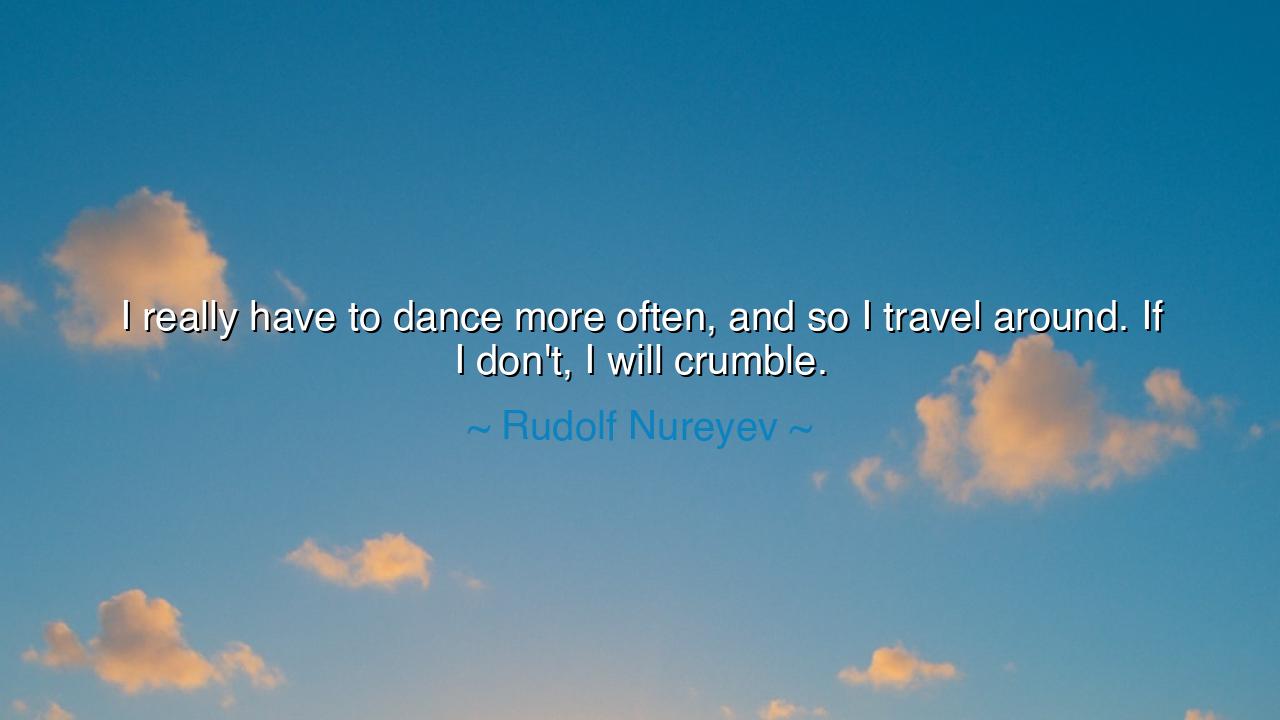
I really have to dance more often, and so I travel around. If I






Rudolf Nureyev once declared: “I really have to dance more often, and so I travel around. If I don’t, I will crumble.” In these words we hear not a casual confession, but the very heartbeat of an artist whose life was inseparable from his art. For him, dance was not pastime nor profession—it was breath itself. To be still too long, to neglect the body’s sacred fire, was to wither, to crumble into dust. This truth belongs not only to dancers, but to all who carry within them a calling that demands expression.
The ancients knew this truth well. The Greeks spoke of the daemon, the inner spirit that drives a person toward their true work, whether in craft, song, philosophy, or war. To betray the daemon was to court despair, for the soul starves when it is denied its purpose. In Nureyev’s cry we hear the same law of spirit: that man must give himself to what keeps him alive within. To dance was his daemon, and thus he traveled ceaselessly, for the road was not merely a road, but a lifeline, a stage upon which his soul refused to be silent.
We might remember the tale of the great composer Beethoven. When his hearing began to fade, he confessed that he considered ending his life, for music was his essence. Yet he resolved that as long as even a fragment of hearing remained, he would compose, for to abandon his art would be death of another kind. In this, he mirrors Nureyev: both men knew that without their craft, they would crumble. And so, Beethoven wrote his most transcendent works when silence had already closed around him, proving that the spirit fed by its art is stronger than despair.
Nureyev’s words also remind us of the sacred union between movement and journey. He could not dance in one place only; his body demanded the horizon, his art demanded new stages, new audiences, new lands. His traveling was not mere escape, but an offering to the world: carrying his flame from city to city, ensuring it did not die in stillness. Here is wisdom: to keep the inner fire alive, sometimes one must move, must change, must wander, lest the soul calcify in routine.
Consider also the wandering sages of the East, who walked from village to village with nothing but their teaching. They knew that stillness without purpose becomes stagnation, but movement with meaning gives life both to the traveler and to those he meets. Just so, Nureyev’s traveling dance was not only for himself, but for all who watched him, for all who needed to glimpse beauty to remember what life could be. His journey preserved not only his own soul, but the souls of those touched by his art.
The lesson for us is clear: discover that which keeps you from crumbling. For some, it is the brush on canvas; for others, the pen on paper; for others still, the tending of a garden or the raising of children. Whatever it may be, do it often. Do not wait for permission. Do not let the world bury your daemon beneath duty or distraction. For if you abandon it, your spirit will fade; but if you honor it, you will live with strength, even in hardship.
To apply this in life, set aside sacred time each day for your calling. Travel if you must—into new lands, or even into new corners of your own soul—so that your craft may stay alive. Let no excuse silence you. As Nureyev danced to avoid crumbling, so must you create, move, speak, or build, to keep the inner flame from going dark. And remember: it is not indulgence, but survival.
Thus, Nureyev’s words become a timeless command: Do not crumble. Dance. Whatever your “dance” may be, give it space, give it motion, give it the breath of your life. For in so doing, you will not only preserve yourself—you will become a beacon for others, reminding them also to rise, to move, and to live in fullness before the dust returns to dust.






AAdministratorAdministrator
Welcome, honored guests. Please leave a comment, we will respond soon